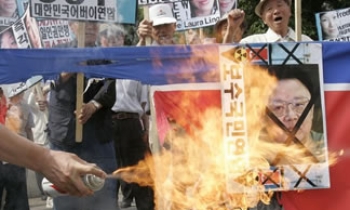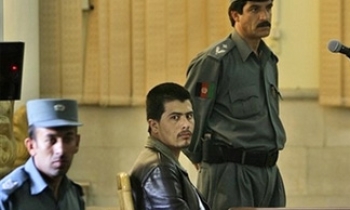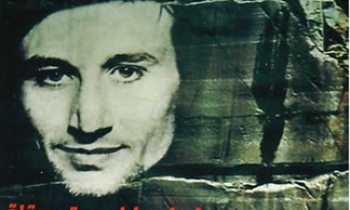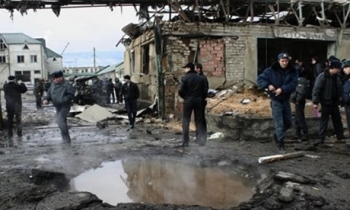KARACHI, Pakistan–In the city that swallowed up Daniel Pearl, a sense of menace still hangs as heavy as the sultry air.
A high-profile new film has focused renewed attention on the case of The Wall Street Journal reporter who was kidnapped and executed by Islamic insurgents here in 2002, and has underscored the fact that many questions remain unanswered.
Investigators in this teeming port city, a long-time hub for Islamic extremists, acknowledge that not all those responsible for Pearl's killing have been brought to justice. And many analysts believe that although the case remains open, the full story behind the kidnapping plot will probably never be known.
"We're never going to get the whole picture," said Christine Fair, a senior research associate in South Asia and terrorism at the U.S. Institute of Peace. "It's like a quilt – it leads you to another patch, and another.''
The most persistently nebulous element of the case, analysts say, is how much Pakistan's powerful Inter-Services Intelligence knew about events surrounding Pearl's capture and execution. Pakistani military intelligence has a history of entanglement with the Islamic militants it is charged with policing.
"There are officials within the security services who are not entirely interested in seeing this (investigation) go forward,'' said John Harrison, a senior researcher for the International Center for Political Violence and Terrorism Research in Singapore. "Not that they were involved in the murder itself, but there are definitely embarrassing connections between the ISI and many of the perpetrators.''
These dark and various complexities underpin the film A Mighty Heart, starring Angelina Jolie and produced by Brad Pitt, which opens in U.S. theatres Friday. Karachi is the real-life backdrop of the movie, based on a book by Pearl's widow, Mariane, although much of the filming was done in India.
The narrative traces the harrowing days and nights that followed the journalist's disappearance, the desperate hunt for clues, and the shattering denouement: Mariane Pearl, then six months pregnant, learning her husband had been beheaded by his captors.
Five years on, the web that ensnared the 38-year-old reporter has echoes everywhere in Karachi, whose 15-million-plus population makes it one of the world's mega-cities, a dizzying mix of festering slum and chic high life.
Home to a network of shadowy extremist groups and a virulent criminal underworld, the city is beset by rising religious militancy, simmering ethnic hatreds and frequent outbreaks of political violence. Karachi's sheer size at times renders it nearly ungovernable, authorities acknowledge.
"With everything that converges here, we have insufficient police resources," said Sain Mirani, the acting director-general of the operations branch of the Karachi police. "There is so much that is hidden, clandestine, and we are always lagging.''
Four men have been tried and convicted in connection with the Pearl case. But the Pakistani legal system is a convoluted one, and appeals have been pending in the courts for years, and could take years more to move forward.
The most prominent of the four defendants was British-born Ahmed Omar Saeed Sheikh, sentenced to death in July 2002 for helping lure Pearl to the fateful assignation. But he is seeking to have his conviction overturned on the basis of a confession by Khalid Shaikh Mohammed, the alleged No. 3 in Al Qaeda, who claims to have personally beheaded the jou rnalist.
Karachi has for years been a crossroads for Islamic militants. The city's deepwater harbour on the Arabian Sea is a prime engine of Pakistan's economy, but the chaotically busy port also serves as a transit point for weaponry and jihadis bound for the fight in Afghanistan, authorities say.
U.S. and Pakistani investigators say there is a continuing overlap between homegrown Pakistani militant groups and broader-based international organizations such as Al Qaeda, and that Karachi has been used as a sanctuary and staging ground.
Karachi was a frequent pit stop for Mohammed, who was arrested outside Islamabad, the Pakistani capital, in 2003. But some investigators regard his claim to have been Pearl's executioner as possibly tainted by his penchant for exaggeration.
"It'll be debated for a long time," said one FBI agent.
American officials consider Karachi so dangerous that the U.S. consulate is an armed fortress whose skeleton staff lives and works in a state of virtual lockdown.
The consulate, surrounded by barbed wire and blast barriers, has been the target of repeated attacks, including a truck bomb in 2002 that killed 12 people and a suicide car bombing in March 2006 that killed four people, including an American diplomat.
But like any enormous metropolis, Karachi contains a multitude of worlds. It is Pakistan's commercial capital, as well as a vibrant arts and cultural centre. Karachi natives tend to have a fierce pride in their home city, insisting that the lively, eclectic rhythms of daily life give lie to its dangerous reputation.
At a recent late-night cocktail party in a wealthy but bohemian district, not far from the rented villa where Daniel and Mariane Pearl stayed while he was working in Karachi, the guests included an up-and-coming fashion designer and an elegantly coiffed television personality. They sipped icy peach-vodka concoctions from tulip glasses while exchanging the latest political and literary gossip.
"Everyone in the outside world thinks of Karachi as some kind of crazy `Terror Central,' but it's a regular place, a place where people go about their lives," one party guest said.
Although the Pearl case has been marked by long periods of inactivity, recent weeks have seen a small but potentially significant flurry of developments. But some raise as many questions as they answer.
Last week, Pakistani police announced the arrests of two more men suspected of involvement in Pearl's abduction and murder. The pair, identified as members of a Pakistani militant group, were picked up in a remote area of Sindh province, of which Karachi is the capital, with a small arsenal of weapons.
And in April, a Pakistani man who owned the property where Pearl was held finally surfaced after dropping out of sight soon after the kidnapping – but sick, emaciated and on the brink of death. The family of Saud Memon said he was dumped outside his home and died weeks later in a hospital.
The family said through lawyers they believed Memon had been in the custody of Pakistani intelligence at some point, and were trying to determine whether he had also been held at Guantanamo Bay.
Other evidence in the case is vanishing. The concrete shed where Pearl was held was once surrounded by remote scrubland. Now it has been overtaken by development, including a car dealership and billboards flagging the impending arrival of new apartments.









